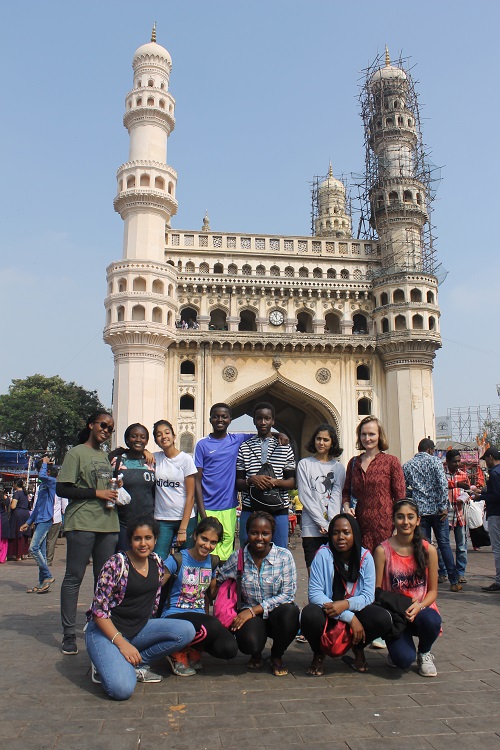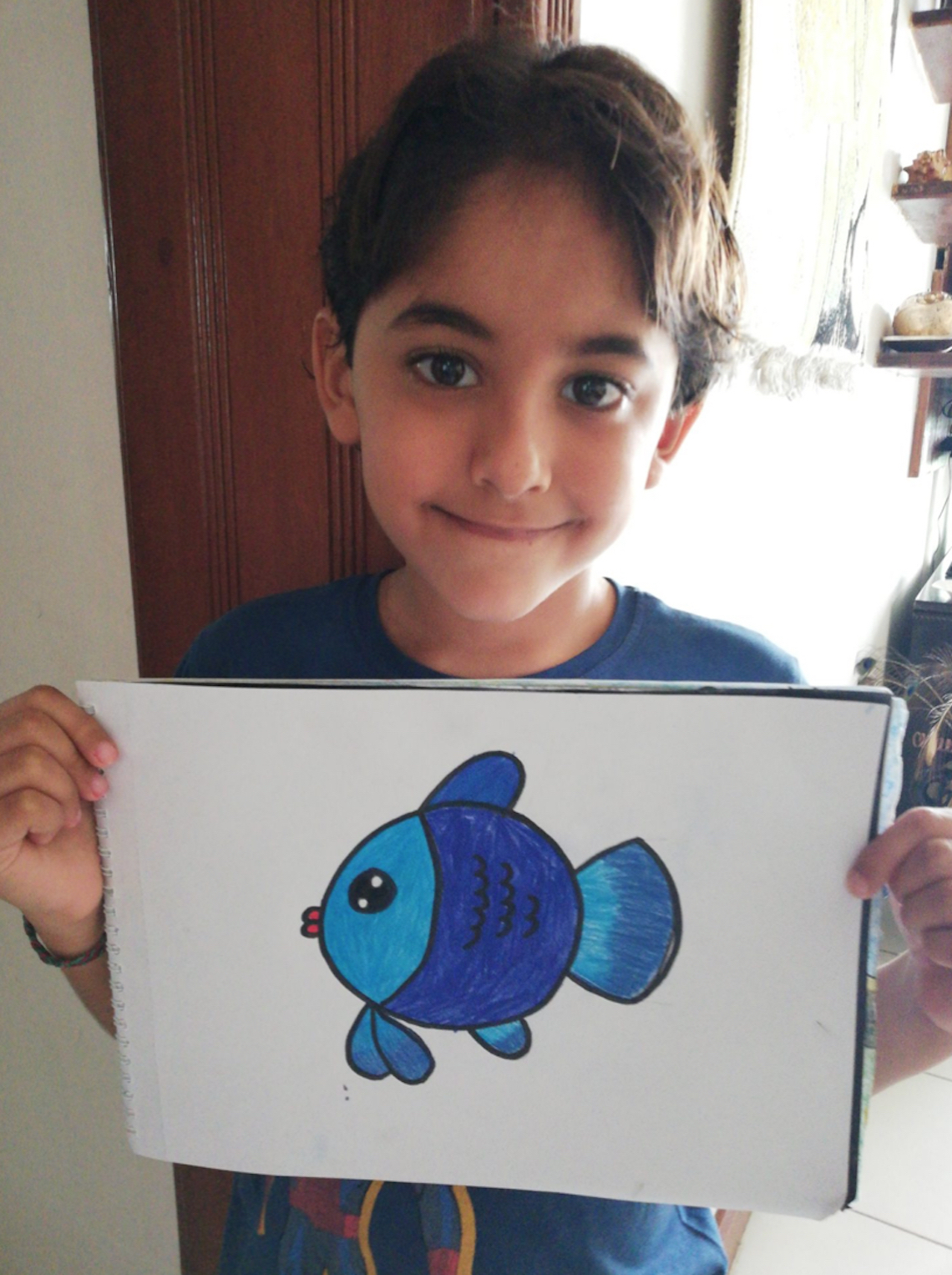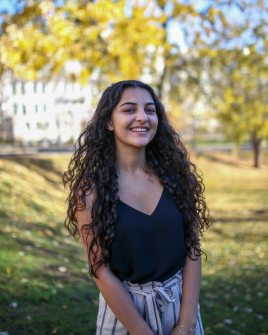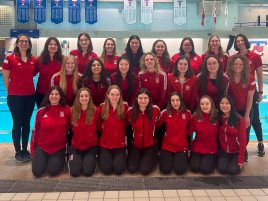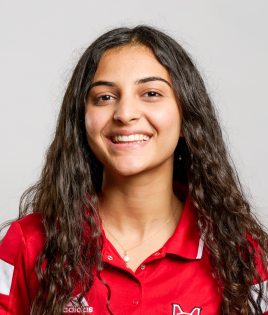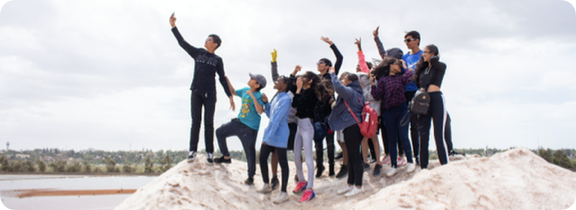
Diploma Programme
The Aga Khan Academy Maputo has received authorisation as an International Baccalaureate (IB) World School offering the IB Diploma Programme (DP). The programme is offered to students (aged 16–19) in the final two years of school.
The Diploma Programme is a demanding, pre-university-level course of studies. It is internationally recognised by over 2,000 universities worldwide.
The DP has a reputation for rigorous assessment of student achievement. Each student’s performance and levels of knowledge are examined internally by teachers according to set criteria. They are also assessed externally by independent examiners according to global standards applied to all IB schools.
Our students study all the subjects covered in a traditional, broad curriculum, including languages, social sciences, experimental sciences, mathematics and the arts. The DP also takes the curriculum a step further through three unique programmes:
- theory of knowledge
- creativity, activity, service
- extended essay.
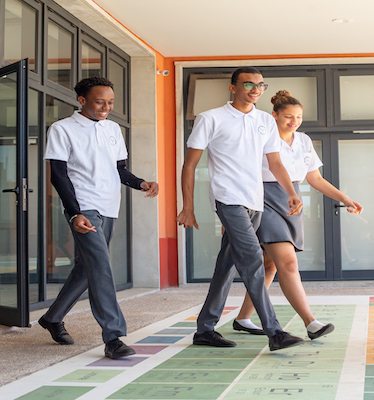 Theory of knowledge
Theory of knowledge
Theory of knowledge (TOK) is an interdisciplinary requirement unique to the International Baccalaureate Diploma Programme. It encourages students to reflect on the knowledge they gain both inside and outside the classroom.
One hundred hours of classroom time are dedicated to the TOK programme. We challenge our students to question the nature of knowledge across disciplines, to recognise biases and to analyse evidence using rational thought and argument. By making our students consider and appreciate different perspectives, TOK contributes towards a pluralistic outlook.
Creativity, activity, service
Creativity, activity, service (CAS) is an important component of the IB curriculum and is required for every DP student at the Academy. Our students participate actively in a variety of creative endeavours, physical activities and community service projects. They develop self-confidence, teamwork and leadership skills, and a sense of civil responsibility.
Students take part in sustainable projects that have real and lasting effects on the greater Maputo community. They develop strength of character and an understanding of their ability to bring about change.
The CAS programme is valued for its power to transform the lives not only of students but also the people they work with. It serves as a platform for interpersonal exchange, personal growth and greater understanding of the issues we face as a global community.
Extended essay
The extended essay requires students to pick a subject of their choice and research and develop it into a 4,000-word essay. Students may choose to investigate a subject from one of their higher-level courses more deeply. Or they can broaden their academic experience by researching a subject in a field they are not currently studying.
Through the extended essay, we introduce students to the kind of independent research and writing skills expected at the university level.
For further information on the IB Diploma Programme at the Academy, please see the admission requirements or contact us.
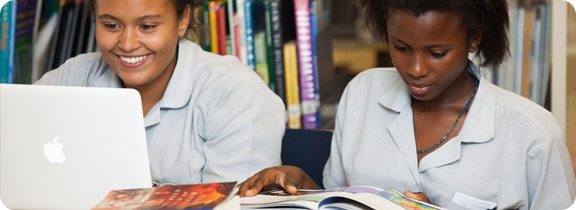
Academic Programme
The Aga Khan Academy, Dar-es-Salaam will initially be opening for Nursery and Junior school students. We offer an education of an internationally recognised standard of excellence to prepare students to become intellectually curious, global-minded citizens of the world.The Academy programme develops students who are committed to positive change and are able to understand and analyse complex issues of local, national and global significance.
Our curriculum is built on the framework of the International Baccalaureate (IB). The IB is a thorough, multidisciplinary curriculum that fosters:
- intellectual curiosity
- creativity
- leadership development
- social consciousness
- a pluralistic sensibility.
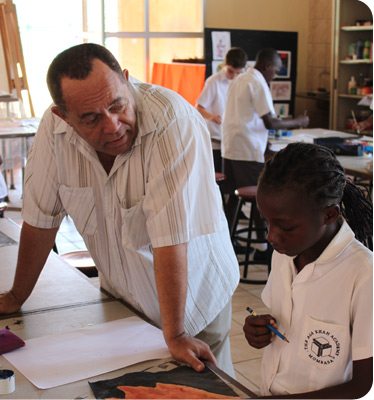 The IB is also known for preparing students for admission to the best universities in their own countries and abroad.
The IB is also known for preparing students for admission to the best universities in their own countries and abroad.
Our focus is on developing students' critical thinking skills and the ability to analyse issues. We also emphasise multicultural understanding and awareness. One of the ways in which we help our students develop skills for ethical leadership is through the Aga Khan Academy Curricular Strands. These are cross-disciplinary areas of study that have been developed for the network of Aga Khan Academies.
Overall Educational Programme
Our curriculum is complemented by co-curricular, athletic and community service initiatives. The overall educational programme is designed to educate well-rounded, civic-minded individuals. It enhances students’ academic excellence, leadership skills, sense of civic responsibility, understanding of global issues, and analytical and study skills. The programme also reinforces an understanding of local languages, history, cultures and environment.
After completing the full Academy programme, students will be expected to be computer literate and have a thorough understanding of the diverse academic disciplines covered in the IB curriculum. They should have mastered at least two languages, including English. Through the planned international exchange programme, our students will be able to enhance their foreign language learning and appreciation of other cultures.
Our graduates thus will be well prepared for the rigours of higher education and to pursue opportunities in an increasingly interdependent world.
For further information on the programme currently being offered at the Aga Khan Academy, Dar-es-Salaam, please visit the Primary Years Programme page.
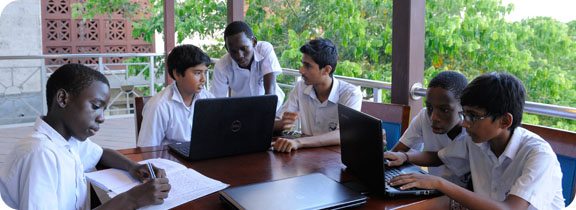
Academic Programme
The Aga Khan Academy Mombasa offers an education of an internationally recognised standard of excellence to prepare students to become intellectually curious, global-minded citizens of the world.
The Academy programme develops students who are committed to positive change and are able to understand and analyse complex issues of local, national and global significance.
Our curriculum is built on the framework of the International Baccalaureate (IB). The IB is a thorough, multidisciplinary curriculum that fosters:
- Intellectual curiosity
- Creativity
- Leadership development
- Social consciousness
- A pluralistic sensibility
The IB is also known for preparing students for admission to the best universities in their own countries and abroad.
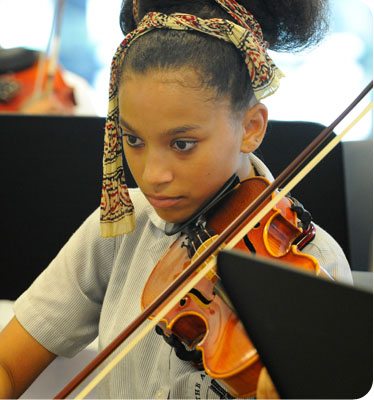 Our focus is on developing students' critical thinking skills and the ability to analyse issues. We also emphasise multicultural understanding and awareness. One of the ways in which we help our students develop skills for ethical leadership is through the Aga Khan Curricular Strands. These are cross-disciplinary areas of study that have been developed for the network of Aga Khan Academies.
Our focus is on developing students' critical thinking skills and the ability to analyse issues. We also emphasise multicultural understanding and awareness. One of the ways in which we help our students develop skills for ethical leadership is through the Aga Khan Curricular Strands. These are cross-disciplinary areas of study that have been developed for the network of Aga Khan Academies.
Overall educational programme
Our curriculum is complemented by co-curricular, athletic and community service initiatives. The overall educational programme is designed to educate well-rounded, civic-minded individuals. It enhances students’ academic excellence, leadership skills, sense of civic responsibility, understanding of global issues, and analytical and study skills. The programme also reinforces an understanding of local languages, history, cultures and environment.
When they graduate from the Academy, students are expected to be computer literate and have a thorough understanding of the diverse academic disciplines covered in the IB curriculum. They should have mastered at least two languages, including English. Through the planned international exchange programme, our students will be able to enhance their foreign language learning and appreciation of other cultures.
Our graduates are thus well prepared for the rigours of higher education and to pursue opportunities in an increasingly interdependent world.
For further information on the IB programmes offered at the Aga Khan Academy Mombasa please visit the following pages:
- Primary Years Programme (years 1–5)
- Middle Years Programme (years 6–10)
- Diploma Programme (years 11–12)
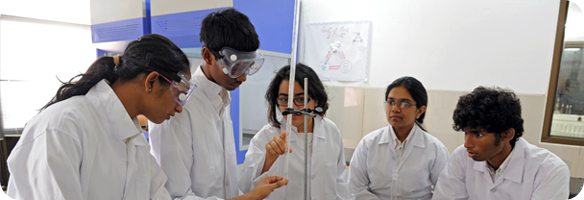
Academic Programme
The Aga Khan Academy Dhaka offers an education of an internationally recognised standard of excellence to prepare students to become intellectually curious, globally-minded citizens of the world.
The Academy programme develops students who are committed to positive change and are able to understand and analyse complex issues of local, national and global significance.
Our curriculum is rigorous and multidisciplinary, fostering:
- intellectual curiosity
- creativity
- leadership development
- social consciousness
- a pluralistic sensibility.
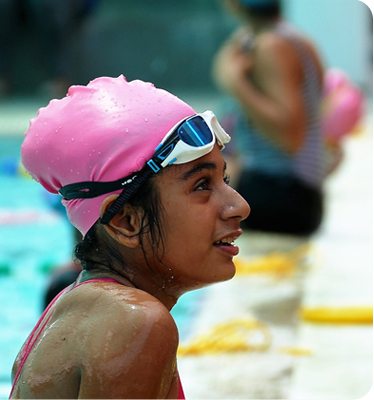 We prepare students for admission to the best universities in their own countries and abroad.
We prepare students for admission to the best universities in their own countries and abroad.
Our focus is on developing students' critical thinking skills and the ability to analyse issues. We also emphasise multicultural understanding and awareness. One of the ways in which we help our students develop skills for ethical leadership is through the Aga Khan Curricular Strands. These are cross-disciplinary areas of study that have been developed for the network of Aga Khan Academies.
Overall educational programme
Our curriculum is complemented by enrichment, athletic and community service initiatives. The overall educational programme is designed to educate well-rounded, civic-minded individuals. It enhances students’ academic excellence, leadership skills, sense of civic responsibility, understanding of global issues, and analytical and study skills. The programme also reinforces an understanding of local languages, history, cultures and environment.
When they graduate from the Academy, students are expected to be computer literate and have a thorough understanding of a diverse range of academic disciplines. They should have mastered at least two languages, including English. Through the planned international exchange programme, our students will be able to enhance their foreign language learning and appreciation of other cultures.
Our graduates are thus well prepared for the rigours of higher education and to pursue opportunities in an increasingly interdependent world.
For further information on the programmes offered at the Aga Khan Academy Dhaka, please visit the following pages:
- Primary Years (Grades 1–5)
- Middle Years (Grades 6–10)
- Diploma Programme (Grades 11–12).
Muskaan Bhaidani (Class of 2020): Journey to university and the Academy's impact
Muskaan Bhaidani is an alumna of the Aga Khan Academy Mombasa who was in the Class of 2020. Graduating with an impressive International Baccalaureate (IB) Diploma Programme (DP) score of 44 out of 45, Muskaan is now attending McGill University in Montreal, Canada.
Read on to see what Muskaan says about university life and how her time at the Academy contributed to who she is today.
Can you please tell us about yourself, Muskaan?
I did the IB DP from 2018 to 2020 and took economics, geography and English at higher levels and mathematics, biology and French at standard levels. At the time, I took these subjects purely out of interest, and I really enjoyed what I did. However, I’ve always wanted to work in the development sector, so I think geography and economics played into that really well. I also did my extended essay in French since I wanted to improve in it, but now that I am studying in Quebec, it’s been really helpful.
How did you manage to narrow down your interests to zone in on a career path finally?
That’s such a big question to answer! Honestly, I still don’t think I know for sure what I want to do. I think that the path that I’ve chosen to take is just to keep going ahead with doing what I like, which right now is international development with a focus on food insecurity. In fact, I did my personal project at the Academy around food insecurity, and passion has definitely stuck with me over the years. I’ve also taken an interest in social entrepreneurship, which I could potentially see myself pursuing in the future. Right now, however, I’ll be going with the flow and figuring things out one step at a time.
How did you find the university application process? What did you find challenging, and how did you choose between all the universities you got into?
The university process is definitely difficult and scary because of the uncertainty it entails. I applied to the US, UK and Canada. I personally felt that applying to Canada was a much easier process since you don’t have to send in any standardised test scores or personal statements. Their supplementary requirements, if any, are very minimal compared to the UK and the US. And since a lot of Academies students end up coming here, it’s nice to know that you have an established system to fall back on if you need to. I think the main reason I got accepted to the universities I applied to was because of my academic performance and extracurricular activities that I took part in at the Academy which have carried me to university. As for how I decided on McGill in the end, it was mainly a lot of research and making pros and cons lists. I tried to compare universities in terms of the course I’ll be studying, what I want to do in the future, opportunities I would get while still studying, acceptance rate, etc., and McGill stood out to me in all these aspects. Montreal is a great city for students, and I am glad it worked out!
What have you done since you joined university that you are most passionate about?
I have been a part of multiple clubs. One, in particular, is IYAD (IRSAM Youth Advisory Delegation), a youth advisory delegation to the United Nations, where we write policies and present them at the UN Headquarters in New York every year, and it’s been something I’m really passionate about as I used to participate a lot in Model UN. I am now an executive in the club! I also took part in Enactus, a social entrepreneurship club where we mainly try to help local businesses thrive, and it has been a rewarding experience. Lastly, I am also a member of the varsity artistic swimming team – I used to do a lot of swimming at the Academy till COVID-19 happened, and this was the perfect way to get back into it in an artistic form I had never done before!
How has university life been? And how have you been preparing yourself for this upcoming exchange programme you are participating in?
Life at McGill differs a lot from person to person, but it mainly consists of class in the morning, followed by any extracurriculars you may have taken up. I also have a student job as a student advisor, so I have that in my routine as well, besides swimming and clubs. Going into your third or fourth year in university also means you have to cook for yourself and run your own household of sorts – this actually makes up a substantial portion of a student's schedule. I don't find it to be incredibly different from the high school experience, it’s just more diverse in terms of what you study within your specified subject. I will be going on an exchange to UCL in London next semester. Of course, I’m nervous, but I’m looking forward to immersing myself in a new culture since I’ll only be there for three months. I do consider Montreal home now that I’ve lived here for three years, and going away from home is daunting. I hope it feels as welcoming as Montreal. But from what I understand, London is very diverse, with lots of things to do, and I know I need to put myself out there and be open-minded.
How has the Academy helped shape you and prepare you for university?
The Academy has taught me how to put myself out there confidently by never limiting me and assuring me that I can do anything I set my heart to. It has a way of boosting your self-esteem and shows you your strengths and uniqueness. I engaged in a lot of communal activities and opportunities at the Academy, so I don’t find it difficult to do the same at university, whether that’s applying for a challenging course, position or an exchange programme.
How important do you think it is for students to reach out to Academies alumni?
I think it’s very important. We all leave school and make great friends at university, but the friends you make at the Academy are just different because it is so easy to spend time with them for hours and feel surrounded by a sense of community and warmth. In fact, my roommate now at McGill is a good friend of mine from the Academy. It is easier to reach out on an established Academies-centric network if and when you need help, especially because all of us who have been through the application process are always willing to help whenever we can. Having an alumni community only makes it more accessible and convenient to reach out.
Do you have any advice for students going through the university application process right now?
Work on your predicted grades, those are very important. Build good relationships with your teachers and they can direct you on how to constantly get better at your subjects. And, this might sound cliché, but be authentic in your applications. You never know what a university wants in its essays, and in a pool of incredibly smart and talented applicants, the only way to truly stand out is to be your unique self. So, focus on what you are interested in as opposed to what you think others might find interesting.
Interview conducted by DP2 student Samhitha Paruchuri from the Aga Khan Academy Hyderabad.
Samantha Caras: Pioneering new approaches to University Counselling
Samantha Caras is from Southern California in the United States and has worked as a University Counsellor at the Aga Khan Academy Mombasa for four years. Her budding journey first began in India where she worked as an Academy Fellow for a year at the Aga Khan Academy Hyderabad supporting the leadership curriculum, helping out with college essay writing and teaching yoga before embarking on her role as a University Counsellor.
During her five years with the Academies, Samantha said her work changed the trajectory of her professional and personal life.
“It showed me that small opportunities, like being sent to a conference can change the course of your life,” Samantha said.
After being mentored in AKA Hyderabad, Samantha set out on a whirlwind experience at AKA Mombasa as a full-time University Counsellor.
“Coming to Mombasa has been exciting because I was able to have a lot of ownership over my work and could structure the office however I wanted,” Samantha said. “The flexibility and creative license I was given allowed me to build and restructure the university counselling programme to fit the diverse needs of our students.” She also said she enjoyed being immersed in many cultures, owing to the diversity of the school, and making friends from all over the world has helped her gain an overseas family for life.
Samantha said what she will miss the most is working closely with the students on their essays, being a part of High-achieving, Low-income (HALI) Access Network (an association of non-profit organisations in Africa that work with high-achieving, low-income students to access international higher education opportunities) and living in beautiful Mombasa. She also said she’s learnt quite a lot professionally, especially about the role of culture and background in higher-education advising.
During her time and position at the Academy, Samantha achieved quite a lot. On a personal level, she managed to finish her Master of Education in International Counselling Psychology, after which she got Minal Shah, the head of student support and well-being, to help her out with a professional internship. For the University Counselling office, Samantha managed to change the structure of the programme to include weekly lessons on topics such as writing a resume; professional communication; writing college essays; mock admissions game; applying for financial aid and scholarships; money matters; budgeting and cost of living abroad; adjusting to life after the Academy; and developed the presentations for these lessons. She also applied for the Academy to become a member of the HALI Access Network, which has increased its visibility and given it access to numerous resources and scholarship opportunities for the Talent Identification programme students over the past four years. Additionally, she contributed to the early drafts of what is now the University Counselling Handbook for the Academies network, set up the office’s social media page on Facebook, and worked with USA-based Ismaili volunteers to develop a sustainable standardised assessment test (SAT) programme for college admissions.
Minal describes Samantha as a warm, open and candid individual who worked well with the students.
“Samantha has built significant bonds with the students she’s worked with,” Minal said. “She always encouraged and pushed the students, who always appreciated her patience, honesty and sense of humour. I will miss working with her and her enthusiasm of making things right for the students. She will be a wonderful addition to any institution she joins.”
For her next plans, Samantha said she will be moving to Quito, Ecuador to work as the college counsellor at an international school.
“It was a difficult decision to leave Mombasa and the Academies, but I am excited for the new experience and to work on my Spanish language skills again,” Samantha said.
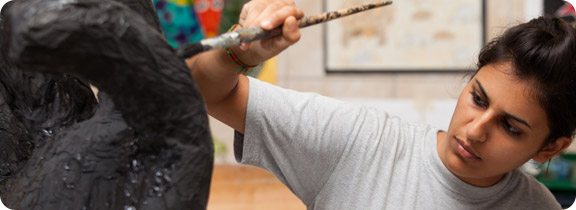
Partnerships
Each Aga Khan Academy benefits from the combined experience of the network of Academies as well as from partnerships with other global networks and institutions. These linkages enable the development and support of world-class standards of excellence.
Aga Khan Development Network
The Aga Khan Academies are one of the key education programmes of the Aga Khan Development Network (AKDN), whose institutions are engaged in a wide array of development initiatives.
AKDN draws on over a century of experience in education from pre-primary to tertiary levels, and includes more than 240 schools and two universities. Students and faculty at each Aga Khan Academy are able to access the intellectual and programmatic resources of AKDN institutions, including the Aga Khan University, the University of Central Asia, the Aga Khan Education Services, the Aga Khan Foundation and the Aga Khan Trust for Culture. The Academies also work in close partnership with AKDN institutions and programmes around the world to provide practical experience opportunities through internships for students and alumni.
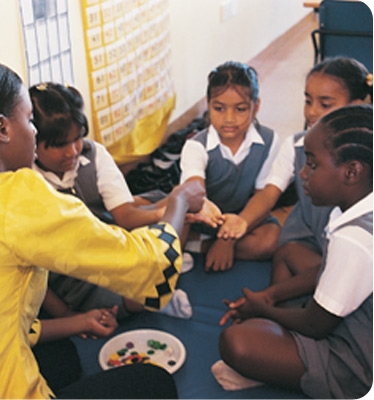
Other leading institutions
The Aga Khan Academies have established formal partnerships with governments, universities and other leading organisations to ensure high standards of practice and foster innovation. Some of the areas that Academies’ partnerships support include best practices in teaching and learning, innovative approaches to teacher education, development of quality campus facilities, supplementary education opportunities for students and access to higher education for talented Academies graduates in need. The Academies have also established partnerships with Ministries and Departments of Education to help strengthen education provision in the countries where our schools are located. Current partners include:
Agencies of the Aga Khan Development Network | International Baccalaureate | Government of Ontario, Canada | Agence Française de Développement | The University of British Columbia Concordia University | California State University, Northridge | Ryerson University | Ministry of Education, Science and Technology, Kenya | Ministry of Education and Human Development, Mozambique | Department of School Education, Telangana, India
In addition, the Academies collaborate with a number of schools and other organisations locally and internationally in areas of mutual interest and to share knowledge and experience.
The IB network
AKDN has a formalised relationship with the International Baccalaureate (IB) through a Memorandum of Understanding between the two organisations.
As IB World Schools, the Academies are closely linked to a network of dynamic IB institutions in over 125 countries, united by a common vision for education and global standards. Guided and facilitated by the IB, this network uses face-to-face conferences and workshops as well as technology to enable teachers and school leaders to gain from each other's experience and to share projects and initiatives.
Ensuring world-class standards
Being connected to these global networks and institutions enables the Academies to test and validate their standards of excellence. These partnerships contribute to the quality of the curriculum and professional development programmes, and ensure that the Academies maintain and enhance their high international standing.
